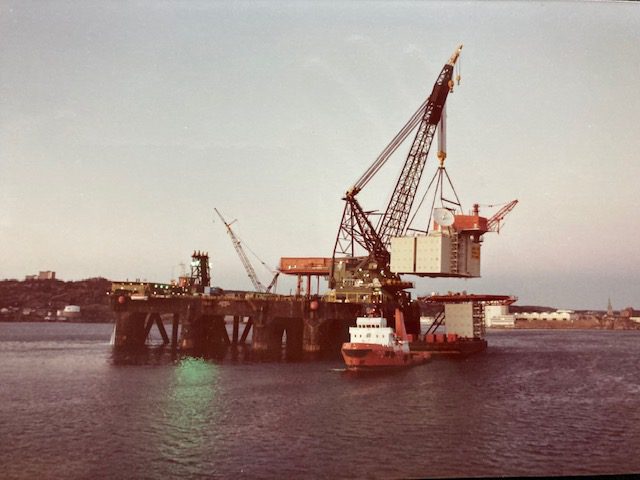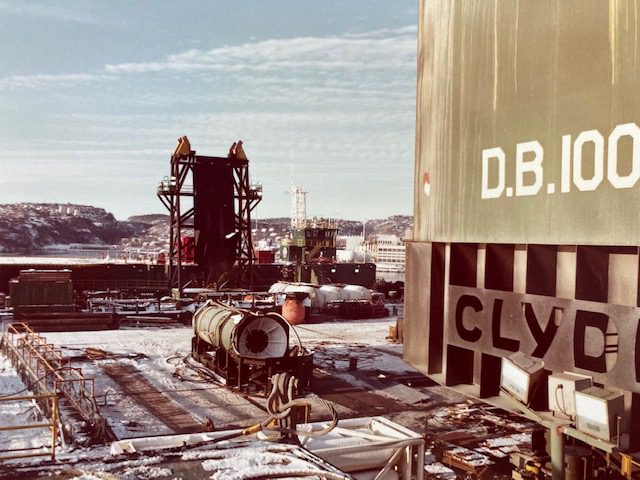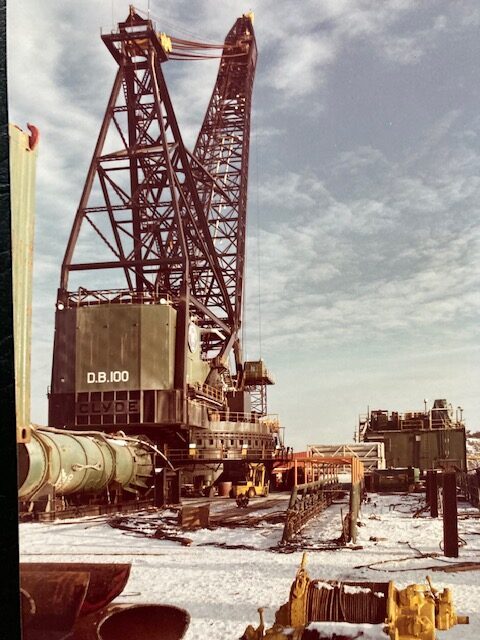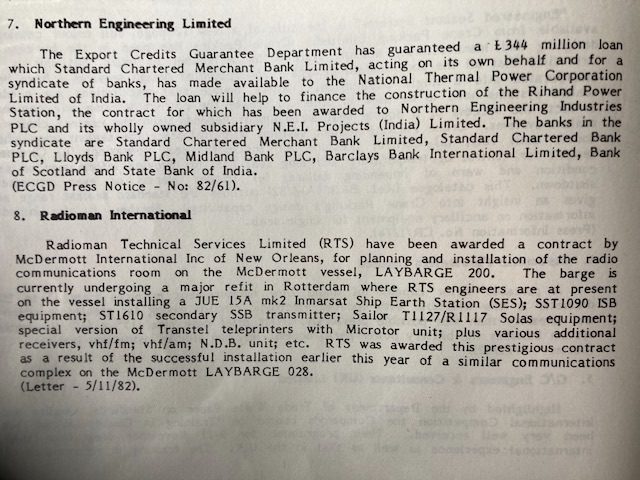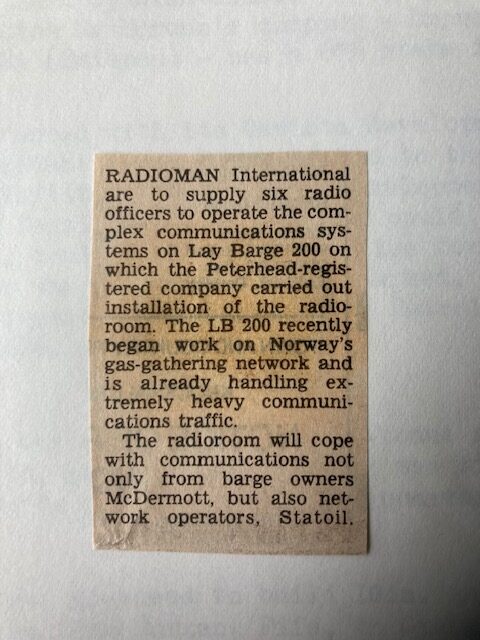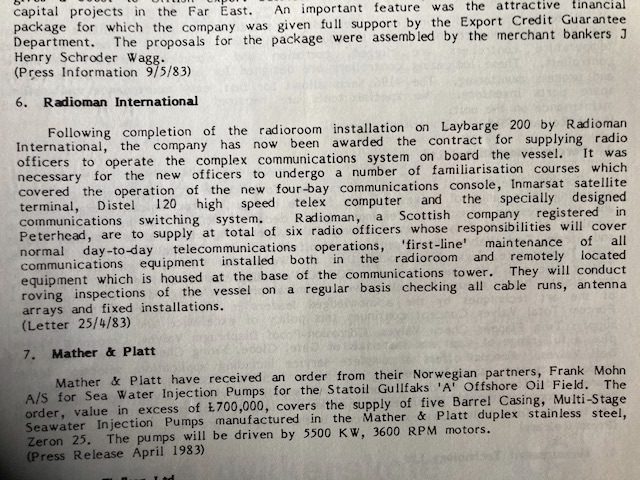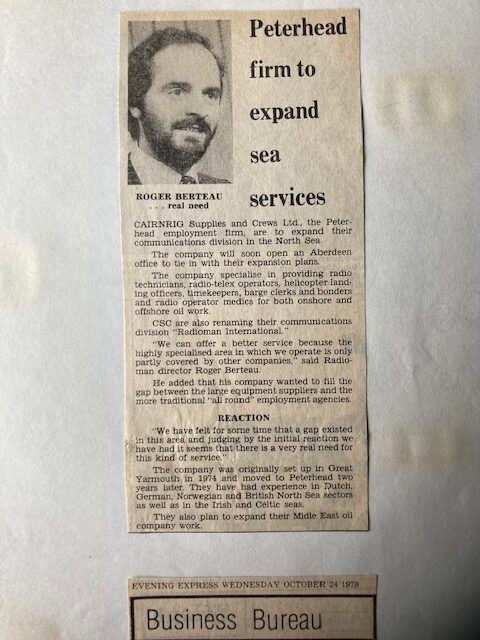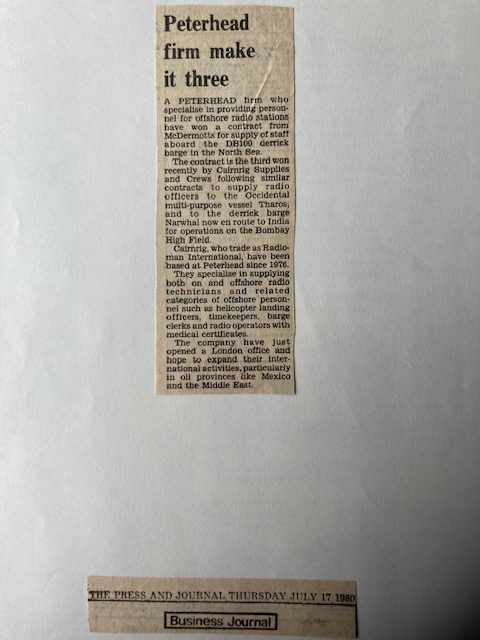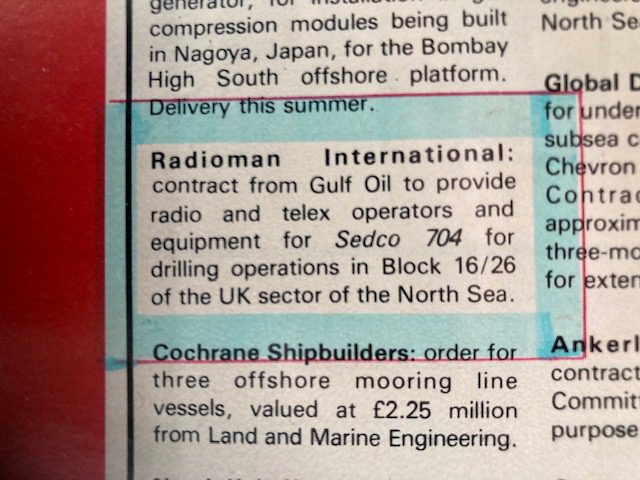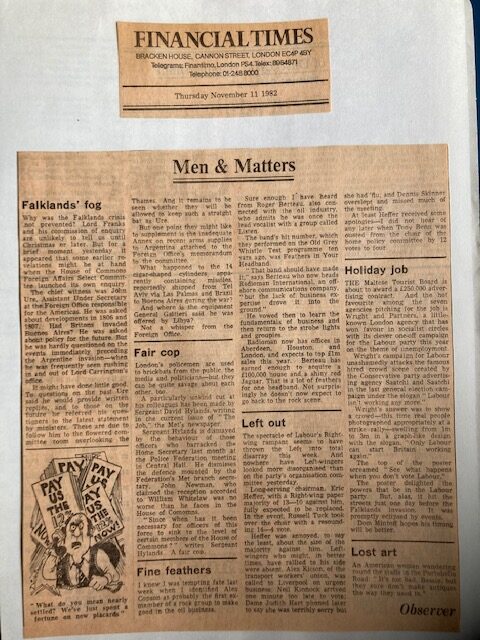Out of the Camp Ch. 18 – Exponential Growth
Then there was the time that we were hired by Construcciones Maritimas Mexicanas (CMM) to maintain and operate communications on two construction barges on a pipe-laying operation for Pemex, the Mexican State Oil Company, in the Bay of Campeche, Gulf of Mexico. The bank refused to factor invoices on this client because of the elevated risk of doing business in Mexico but, since the referral had come from McDermott and that they owned one of the vessels chartered for the job, and also that CMM are a subsidiary of Protexa, a huge Mexican multi-national construction company active in railways, roads, dams, bridges and offshore industries, we thought it was a calculated risk and that we’d be OK. Ha!
After four months on the contract, an ever larger spiraling debt and, despite multiple statements and follow-up phone calls, no invoices paid, there was no choice but to take a trip to their offices in Monterrey, Mexico in an attempt to shake some cash out of the tree. I’d never heard of Protexa before, never mind CMM, so I didn’t quite know what to expect and was really surprised at the scale of the huge complex that was their corporate and central operations headquarters. I spent a couple of days there basically being given the run-around and since I didn’t speak a word of Spanish I was completely at their mercy and clueless as to what was taking place. To be fair, the operations folk did take me out for lunch one day to a noisy, chaotic taverna that felt more like a bar and, indeed, everyone did have a beer with their food before going back to work. It was pretty wild and the food I remember was great but don’t ask me after all this time what I ate. It was no surprise that I didn’t leave clutching a fat cheque but rather, had to settle for a promise that we’d be paid within the week. Actually, I pretty much expected this but the real reason for the trip was to try to cement relations in the hope that there might be the possibility further work in the future. Back in the UK we were finally paid in full five weeks later after I’d pulled our men off the contract and brought them home and, not surprisingly, we never heard from CMM again and they similarly didn’t hear from us. For a small company to be extending that level of credit to a massive conglomerate half-way around the world wasn’t worth the loss of sleep. It wasn’t long after that when we moved back to London and picked up our first government contract, supplying communications services for British Gas on a number of the Morecambe Bay Gas Field platforms.
After almost five years in Peterhead and within 18 months of our return south we were approaching revenues of $4.4M annually with a workforce close to 100 supplying such companies as Atlantic Drilling (Ben Vrackie & Ben Doran rigs), BP (Polycastle Accommodation Platform), Deutsche Marathon (offshore Cuxhaven Base), Burmah Oil (our first ONSHORE drilling contract, Fife, Scotland), Ferranti Offshore, Forex Neptune, Gulf (UK), Houlder Marine, Jebsens Drilling (Sinbad Saxon rig), Land & Marine Engineering, Penrod Drilling (Penrod 85 rig), Smedvig Drilling, Maersk Drilling (Maersk Piper rig), Norwegian Gulf, Santa Fe (Apache Drillship), Rowan Drilling (Arch Rowan rig), Marathon Oil, Western Oceanic, Wilhelmsen Shipping (heavy lift vessels carrying semi-sub rigs from Ijmuiden, Netherlands to Port Hueneme, CA).
In addition, we also continued with McDermott on multiple vessels in different parts of the world on the Jaramac 57 drillship, construction barges, DB24, DB19, DB15, DB11, DB3, DB4, DB100, DB101 and pipelay barges LB200, LB27 and LB28. And with Sedco, managing MSV Tharos in the North Sea, and drilling rigs Sedco ‘H’, 700, 703, 704, 707, 709 also mainly in the UK and Norwegian North Sea sectors and occasionally West Africa. Brown & Root continued with the Ekofisk construction project in Norway for a number of years and also used us overseas on their construction barges BAR 423 & BAR 331. We were active in many North Sea projects in British, Norwegian, Danish, German and Dutch sectors and, worldwide, in the Irish Sea, West Africa, Brazil, South China Sea, Mexican Gulf, California Coast, Bombay High and the Middle East.
Much of this is a distant blur now with things happening so fast I relied heavily on the wonderful small group of staff that we’d assembled in London who kept things humming while I was traipsing all over the place. I honestly got to the point on several occasions when I dreaded getting on a plane. Aberdeen, Brussels, Antwerp, Rotterdam or even Stavanger weren’t so bad but, travel further afield became an anathema to me. I don’t know how I ever ended up 6,000 miles away over here. Actually, and at one point, British Airways eased the pain with a letter telling me that they’d elevated my Silver Tier Executive Club Membership to Gold Tier in recognition of the amount of filthy lucre I was forking out to them every year. Actually, the lounges are very nice but the main benefit of this for someone who only ever travelled coach was to be regularly bumped up to Business Class at no charge as soon as I flashed my BA ‘Executive Gold’ Card at the check-in desk! Anyway, I digress, whenever I had some time to read, whether it was on a plane, at home or during a quiet spell in the office, it was usually trade press, keeping abreast of developments in the industry, press coverage announcing the launch of new vessels and where they’d be operating, watching for announcements of offshore construction or drilling contract awards and generally educating myself in the various general business administrative responsibilities I’d unwittingly lumbered myself with.
I’d been a member of various business organizations for a number of years, initially Aberdeen Chamber of Commerce which was useful for developing contacts and informative when hosting seminars on various business-related topics. I’d occasionally attend industry events such as Offshore Europe in Aberdeen, Offshore Northern Seas in Stavanger in addition to the annual Offshore Technology Conference in Houston which was more of knees-up than anything else, and various seminars and conferences around the country. Membership of the London Chamber of Commerce, years before we returned to London, had proved invaluable when their Commercial Library was active before Google. I called them regularly over a number of years with all kinds of business questions and problems related to just about anything and I can’t credit them enough for all the valuable information they provided me with. I attended several courses in person at LCCI in the city and also at such places as Robert Gordon’s Tech, Aberdeen; Erasmus University, Rotterdam and an incredible course in the wide-ranging history of business finance at City, University of London in which, among other worthy stuff I learned about the Post-World War II Bretton Woods Conference which was attended by representatives of more than 40 countries and ratified the international business landscape going forward and established the International Bank for Reconstruction and Development.
The move to London had been a huge undertaking for a young family and not a little disruptive but somehow, we got through it and the kids now of school age, were enrolled at St. Joseph’s Catholic Primary School in Hanwell, West Ealing. Mary was still home and actively engaged with the business but anxious to get back to nursing. Many of our friends and her former nursing colleagues had gone into Health Visiting and she was seriously considering that also. Mary, an Irish catholic, was always a voracious reader and, in the Irish tradition, her writing wasn’t too shabby either. She’d certainly put me to shame and would have taken me to task over the content of this rubbish! Anyway, she always had, or was seeking, a ‘Cause’ that would motivate her. SPUC (The Society for the Protection of Unborn Children), was the first I recall she became passionate about when we still lived in Peterhead and the President and founder of SPUC, Phyllis Bowman, was coming to address a meeting of the Society’s local chapter and Mary, who’d recently become involved, volunteered to put her up at our home for the night.
Now, back in London and with some time on her hands and for reasons best known to herself, Mary began studying Russian and enrolled in a class at Hammersmith College, as it was then, attending evening classes. She became friendly, as did we all, with the lecturer, Irina, who I’m still in touch with. She came over for dinner one evening with a male friend – we weren’t sure of the precise nature of the relationship at first, but he wouldn’t come into the house. Irina explained that Dima had recently arrived from the Soviet Union with the help of a marriage of convenience with a British woman, and he felt uncomfortable and would wait outside. Can you imagine? We were about to sit down and have dinner and she appeared to be quite comfortable having him wait outside. This was too bizarre. Mary and I felt extremely awkward and somewhat irritated not only with his behavior but also with Irina’s infuriating nonchalance as she just shrugged. I went outside to try to persuade him to come in, but he wouldn’t budge. I was relieved to discover that he spoke English albeit heavily accented, was extremely polite and concerned that we shouldn’t be inconvenienced but was quite adamant and insisted on remaining where he was. I went back inside, reported on my lack of progress whereupon Mary picked up a plate, loaded it up with food, poured him a glass of whatever it was that we were drinking and stormed outside with it, muttering “This is (expletive!) ridiculous!”. I heard him protesting, “No! No! No!” as she put them on the wall and marched back into the house. Irina explained that he was very proud and didn’t want people to think he was a beggar. We later learned that he was from Novosibirsk, had been an ace Soviet fighter pilot and left the service somewhat under a cloud, at which point he decided to get out and escape to the West.
Images.
(1) Derrick Barge setting a topsides on platform jacket. (2) Materials storage area on McDermott Derrick Barge 100. (3) Another shot onboard DB 100. (4) – (9) Media coverage of company activities.







